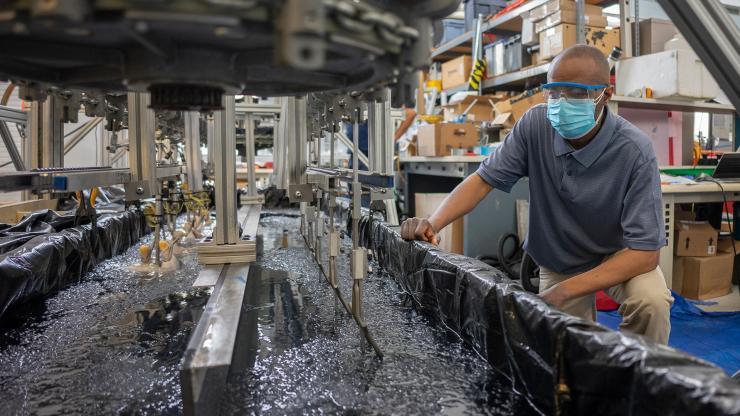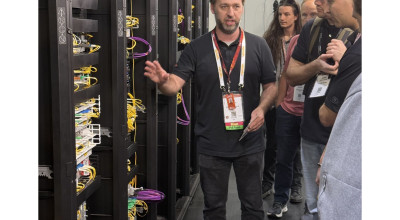
 GTRI’s Comas Haynes, Ph.D., has been honored with Georgia Tech’s Executive Vice President for Research (EVPR) Institute Research Award for Outstanding Achievement in Research Engagement and Outreach. This prestigious recognition highlights Haynes's contributions to energy sustainability, research outreach, and STEM diversity.
GTRI’s Comas Haynes, Ph.D., has been honored with Georgia Tech’s Executive Vice President for Research (EVPR) Institute Research Award for Outstanding Achievement in Research Engagement and Outreach. This prestigious recognition highlights Haynes's contributions to energy sustainability, research outreach, and STEM diversity.
Haynes is a Principal Research Engineer in GTRI's Aerospace, Transportation & Advanced Systems Laboratory (ATAS) and Branch Head of its Materials and Energy Branch.

In addition, Dr. Haynes contributes extensively to the Agricultural Technology Research Program (ATRP). One of his current projects is "enhanced chilling," which improves upon traditional immersive chilling processes for poultry processing.
"In like 2008 - 2009, I came to this part of GTRI, this division and poultry processing,. The "Ag tech" sector is a huge part of what we do in the division, and I was trying to find my space as to how I could try to contribute with a thermal systems background. Soon enough, I found out about chillers and how chilling is normally done."
The Georgia Tech Research Podcast recently aired an episode on Comas Haynes' work on the "Enhanced Chilling" project. Please listen to it here.
In addition to his research roles at GTRI, Haynes serves as the Hydrogen Initiative Lead at Georgia Tech's Strategic Energy Institute (SEI), one of Georgia Tech's ten interdisciplinary research institutes dedicated to tackling critical challenges in energy production, distribution, and utilization. At SEI, Haynes spearheads initiatives promoting hydrogen as a sustainable alternative fuel, underscoring the institute’s commitment to decarbonizing industries and promoting renewable energy solutions.
Dr. Comas Haynes leads research efforts in sustainable energy and food processing.
Haynes's research expertise encompasses thermal system analysis, fuel cell systems, energy storage, and alternative energy solutions, placing him at the forefront of innovative energy technologies. Recently, his expertise was recognized nationally with an appointment to the U.S. Department of Energy’s inaugural Industrial Technology Innovation Advisory Committee (ITIAC). There, he collaborates with prominent leaders from academia, industry, and government to strategize best practices for significantly reducing emissions within America's industrial sectors.
Haynes on Outreach
Haynes is deeply committed to nurturing future STEM leaders. This is evidenced by his extensive collaborations with Historically Black Colleges and Universities (HBCUs) and Minority-Serving Institutions (MSIs). Drawing from his personal experiences as a student, he prioritizes engagement and outreach to produce future generations of researchers, particularly energy researchers.
"My journey has led me from being a beneficiary of these initiatives to now a benefactor. I've been privileged to participate in various projects, particularly with the Department of Energy, while collaborating with institutions like my alma mater, Florida A&M University, and Clark Atlanta University. Through these partnerships, we're not only co-investigating clean energy technologies but also nurturing a pool of STEM talent, which will be essential for addressing our many energy needs.”
A Leader in Energy Research
Haynes is a “Double Jacket,” having earned his Ph.D. and master’s degrees from Georgia Tech, following earning his bachelor’s degree from Florida A&M University.
His scholarly work, including publications on fuel cell systems, energy storage, and thermal management, underscores a career dedicated to advancing technical knowledge and practical applications that address pressing global energy challenges.
The EVPR Institute Research Award is presented annually to recognize exceptional Georgia Tech faculty and researchers whose work significantly impacts both the academic community and broader society. As an R1, top research university, Georgia Tech is shaping the future of basic and applied research by pursuing inventive solutions to the world’s most pressing problems. Our exceptional community of academic faculty, researchers, staff, and students innovate at the intersection of disciplines to further new frontiers in science and technology.
Haynes’s award exemplifies how GTRI researchers continue to set benchmarks for excellence in applied research, engagement, and innovation, furthering Georgia Tech’s mission to address some of the world's most urgent scientific and technological issues.
Dr. Haynes embodies GTRI’s vision that “Our people are the foremost innovators creating a secure nation, a prosperous Georgia, and a sustainable world.” He is also committed to GTRI’s Mission to “improve the human condition” and “educate future technology leaders.”





